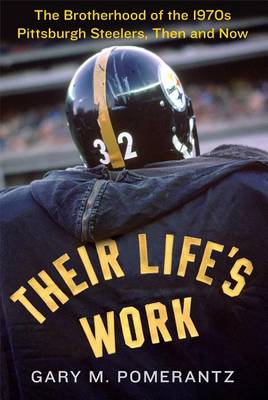By Scott Brown
http://espn.go.com/blog/pittsburgh-steelers
November 13, 2013

PITTSBURGH -- He arrived at St. Vincent College in the summer of 1981, a wide-eyed intern who had received the assignment of a lifetime from his bosses at the Washington Post.
Go to Latrobe, they told Gary Pomerantz, and write about whether the Pittsburgh Steelers’ dynasty of the 1970s had finally gone the way of every other dynasty in the history of mankind.
Pomerantz still has vivid memories of the time he spent at the bucolic site of the Steelers’ training camp, which came at a time when it was common for players as exalted as “Mean” Joe Greene to conduct interviews in their dorm rooms.
 “As he’s talking,” Pomerantz recalled of an interview with Greene, “I’m thinking this guy’s bicep is bigger than my thigh. I no doubt was starry-eyed, but these guys moved with such swagger. They were special. They were historic. And they knew it and they were all great interviews. I think that’s where the seed for this book was planted. This was the greatest team ever.”
“As he’s talking,” Pomerantz recalled of an interview with Greene, “I’m thinking this guy’s bicep is bigger than my thigh. I no doubt was starry-eyed, but these guys moved with such swagger. They were special. They were historic. And they knew it and they were all great interviews. I think that’s where the seed for this book was planted. This was the greatest team ever.” More than 30 years later, Pomerantz has written what may be the definitive book of the 1970s Steelers. “Their Life’s Work: The Brotherhood of the 1970s Pittsburgh Steelers, Then and Now” doesn’t just chronicle the Steelers’ greatness in the decade they owned, at a time when Pittsburgh needed to feel good about itself. It also follows the players from those teams after Super Bowl glory had receded into their respective pasts – and casts a light on the trade-off they made to play a violent game that has had tragic consequences.
“I thought if I’m going to take on the game for what it gives and what it takes, who better to use as a case study than the greatest team I ever saw?” Pomerantz said of the fifth book he has written. “They’ve lived the full measure now of the football experience. They’re in their 60s. Many of them are grandfathers with titanium in their knees, hips, shoulders.”
More than 10 players from those teams have already died, and Hall of Fame center Mike Webster literally gave his life to the game and is the most tragic figure from the teams that won four Super Bowls.
Webster died in 2002 at the age of 50, after suffering from dementia that has since been linked to football and chronic traumatic encephalopathy (CTE). Pomerantz said the book is not a fairy tale, as it examines the reality of life after football, but he was also struck by something during the course of his research.
All of the players he interviewed from the four Super Bowl teams said they would do it again, even knowing the various health problems they would endure later in life.
“I think we all make compromises in our lives,” Pomerantz said. “The 60-hour-a-week businessman never sees his kids, and the minister and social worker give up money to follow their calling. These guys were the gladiators and they paid a physical price, and pay it every day now still, for having walked into the arena as young men, into that brilliant light, and they hear the roar of the crowd and they played a very violent game.”
Pomerantz, 52, conducted more than 200 interviews for the book, which was released last month, and he said players were more than generous in sharing their stories and recollections. He marveled at how close the players from those teams still are, and he said their bond made him examine his own friendships.
“It was the brotherhood that struck me as most remarkable,” said Pomerantz, who is a full-time author as well as a visiting lecturer in the graduate journalism program at Stanford. “My great takeaway from working on this book is that I really think more deeply about those special friendships I have in my life, and I know how lucky all of [us] would be to have the kind of friendships that these 1970s Steelers share today.”


No comments:
Post a Comment